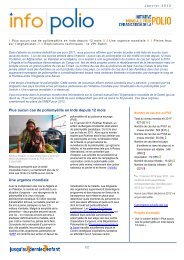(EAP) 2012-2013 - Global Polio Eradication Initiative
(EAP) 2012-2013 - Global Polio Eradication Initiative
(EAP) 2012-2013 - Global Polio Eradication Initiative
Create successful ePaper yourself
Turn your PDF publications into a flip-book with our unique Google optimized e-Paper software.
28 global <strong>Polio</strong> emergency action Plan <strong>2012</strong>-13<br />
Inter-Agency Innovation Working Group (IIWG)<br />
to identify systemic challenges and root causes and<br />
drive innovations to improve operations. Key activities<br />
are detailed in Web Annex 8b, at www.polioeradication.org.<br />
<strong>Polio</strong> Advocacy Group (PAG) to mobilize resources to<br />
close the <strong>2012</strong>-13 funding gap and develop long-term<br />
funding and support for the programme. This group<br />
has reconstituted previous, siloed groups to ensure innovative,<br />
strategic approaches to building support and<br />
funding, and to ensure closer alignment of strategy<br />
and implementation. It includes spearheading partners,<br />
BMGF, UN Foundation and integrates with other<br />
0rganizations working in vaccine advocacy (See Section<br />
10 for details on <strong>2012</strong>-13 funding gap).<br />
Additionally, a <strong>Global</strong> <strong>Polio</strong> Partners Group (PPG)<br />
has been constituted: (1) to serve as the stakeholder<br />
voice for GPEI in the development and implementation<br />
of short-term and long-term polio eradication strategic<br />
plans and emergency action plans; and (2) to foster<br />
greater engagement among polio-affected countries,<br />
donors and other partners with the objective of utilizing<br />
their political, communications, programmatic and<br />
financial capabilities to ensure GPEI has the necessary<br />
political commitment and financial resources to reach<br />
the goal of polio eradication.<br />
PPG membership is inclusive and will be comprised of<br />
senior representatives of the PESC agencies, donors and<br />
prospective donors, polio-affected countries and other<br />
NGOs and foundations working in polio eradication.<br />
The PPG will meet every six months, with the possibility<br />
of ad-hoc conference calls or meetings in between.<br />
8.2 Enhanced technical assistance:<br />
standing and surge capacity<br />
A key lesson learnt from 2011-12 has been the need to<br />
increase substantially external technical assistance to accelerate<br />
eradication and build capacity in the worst -performing<br />
and persistent transmission areas. Consequently,<br />
standing capacity and surge capacity for technical<br />
support to countries is being significantly supplemented<br />
in the following settings (see Figures 2 and 3 for details).<br />
Nigeria and Pakistan<br />
Intensified technical assistance will be provided all the<br />
way to the subdistrict levels as was done in India.<br />
Action to stop polio now in nigeriA, pAkistAn And AfghAnistAn<br />
Afghanistan, Chad, DR Congo and Angola<br />
Intensified technical assistance will be provided to the<br />
state/provincial levels.<br />
For both endemic and re-established transmission<br />
countries such technical assistance will comprise:<br />
• Long-term support in key transmission zones to<br />
strengthen the capacity of agency teams and to<br />
achieve high quality immunization, communication<br />
and social mobilization, field monitoring and<br />
surveillance activities;<br />
• Operations management support to agency teams;<br />
• Epidemiological and data support to national agency<br />
teams;<br />
• Support for specific activities, including surveillance<br />
assessments, quality reviews, assessment of innovations,<br />
management reviews, etc.<br />
New outbreak situations 15 :<br />
In outbreak situations, both short- and medium-term<br />
surge support to country programmes will be provided.<br />
The objective is to support national programmes<br />
and partner agency teams in-country to cover both<br />
the initial response stage (detailed investigation, planning<br />
of response, and immunization and surveillance<br />
response) and the phase of consolidation when interruption<br />
of transmission is ensured. Outbreak managers<br />
are designated at regional and global level to support<br />
country programmes and effectively coordinate partner<br />
agency teams. WHO, UNICEF, and CDC maintain rosters<br />
of staff that can be dispatched at short notice in<br />
response to outbreaks.<br />
Countries and areas at high risk of importation and<br />
outbreaks as identified by regular (three-monthly)<br />
risk assessments 16<br />
The following short- to medium-term support will be<br />
provided to this category of countries:<br />
15 Which can be in polio-free countries or polio-free areas of<br />
currently infected countries.<br />
16 Including those countries/areas that suffered outbreaks in 2011.




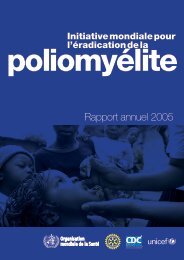
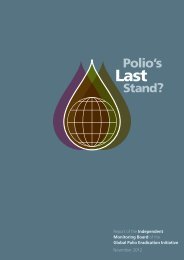
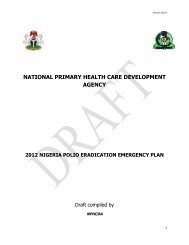
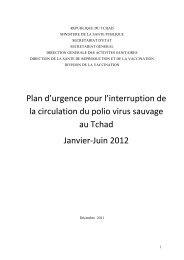
![English [pdf 2MB] - Global Polio Eradication Initiative](https://img.yumpu.com/6380394/1/190x245/english-pdf-2mb-global-polio-eradication-initiative.jpg?quality=85)
